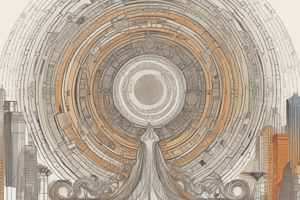Podcast
Questions and Answers
What is a primary challenge in defining the role of an arts manager?
What is a primary challenge in defining the role of an arts manager?
- The role is clearly documented across all fields.
- The arts management field is highly fragmented. (correct)
- Arts management is a well-defined discipline.
- Arts managers primarily focus on marketing.
Why is it important to study arts management?
Why is it important to study arts management?
- To understand the financial aspects of running an art gallery.
- To master creative writing techniques for artist biographies.
- To analyze the concentric circles model related to arts and culture. (correct)
- To learn about the historical significance of classical art forms.
What aspect distinguishes arts management from other fields?
What aspect distinguishes arts management from other fields?
- It is governed by strict regulatory standards.
- It has a well-defined set of obligations.
- It borrows from multiple and varied fields. (correct)
- It is solely focused on fundraising activities.
Which of the following best describes the role of an arts manager?
Which of the following best describes the role of an arts manager?
What is one of the key terms associated with the study of arts management?
What is one of the key terms associated with the study of arts management?
What does the term 'function' refer to in the context of arts management?
What does the term 'function' refer to in the context of arts management?
How is the role of an arts manager distinct from that of a non-arts manager?
How is the role of an arts manager distinct from that of a non-arts manager?
According to DeVereaux, what is essential for an arts manager beyond performing tasks effectively?
According to DeVereaux, what is essential for an arts manager beyond performing tasks effectively?
Which statement best describes the concept of 'role' in arts management?
Which statement best describes the concept of 'role' in arts management?
What is one implication of Davis and Barrett's view on roles in the context of arts management?
What is one implication of Davis and Barrett's view on roles in the context of arts management?
What aspect of management does The Arts Management Handbook primarily emphasize?
What aspect of management does The Arts Management Handbook primarily emphasize?
Which statement best describes the approach taken by Arts Administration and Management?
Which statement best describes the approach taken by Arts Administration and Management?
What contribution does Roswell's Arts Management: Uniting Artists and Audiences make to the understanding of arts management?
What contribution does Roswell's Arts Management: Uniting Artists and Audiences make to the understanding of arts management?
How do John Pick and Malcolm Anderton define the role of arts administrators?
How do John Pick and Malcolm Anderton define the role of arts administrators?
What role does the National Endowment for the Arts play in the context of arts management in the United States?
What role does the National Endowment for the Arts play in the context of arts management in the United States?
What is a key purpose of government involvement in the arts according to the National Foundation on the Arts and Humanities Act?
What is a key purpose of government involvement in the arts according to the National Foundation on the Arts and Humanities Act?
What common characteristic do applicants to cultural management programs in France share?
What common characteristic do applicants to cultural management programs in France share?
What issue do many Canadian artists face regarding their financial stability?
What issue do many Canadian artists face regarding their financial stability?
What does the legislation like the Canada Council for the Arts Act primarily focus on?
What does the legislation like the Canada Council for the Arts Act primarily focus on?
What is suggested about the future of students who apply to arts management programs compared to other programs?
What is suggested about the future of students who apply to arts management programs compared to other programs?
Flashcards
Arts Manager Role
Arts Manager Role
The role of an arts manager is more than just managing an arts organization; it involves coordinating and facilitating different aspects of arts production and delivery.
Arts Management Field
Arts Management Field
Arts management is a field with diverse origins and influences from other disciplines, without a clear, established, or agreed-upon history.
Arts Management Roles
Arts Management Roles
An arts manager's responsibilities go beyond basic obligations and involve their multifaceted contribution to the arts.
Public Good & Public Broadcasting
Public Good & Public Broadcasting
Signup and view all the flashcards
Concentric Circles Model
Concentric Circles Model
Signup and view all the flashcards
Function of an arts manager
Function of an arts manager
Signup and view all the flashcards
Role of an arts manager
Role of an arts manager
Signup and view all the flashcards
Arts Manager vs. Non-Arts Manager
Arts Manager vs. Non-Arts Manager
Signup and view all the flashcards
Context in Arts Management
Context in Arts Management
Signup and view all the flashcards
Role vs. Function in a nutshell
Role vs. Function in a nutshell
Signup and view all the flashcards
Arts Management
Arts Management
Signup and view all the flashcards
Arts Administration
Arts Administration
Signup and view all the flashcards
Management Perspective
Management Perspective
Signup and view all the flashcards
Intermediary (in arts)
Intermediary (in arts)
Signup and view all the flashcards
National Endowment for the Arts
National Endowment for the Arts
Signup and view all the flashcards
Cultural Policy Tools
Cultural Policy Tools
Signup and view all the flashcards
National Arts & Humanities Act
National Arts & Humanities Act
Signup and view all the flashcards
Canada Council for the Arts Act
Canada Council for the Arts Act
Signup and view all the flashcards
Cultural Management Degree Applicants
Cultural Management Degree Applicants
Signup and view all the flashcards
Socialization & Upbringing
Socialization & Upbringing
Signup and view all the flashcards
Study Notes
Key Concepts & Terms
- Arts management is a field requiring understanding of arts organizations, roles, and purpose.
- Arts managers are involved in the daily operations of arts organizations.
- Arts management often involves analyzing the effectiveness and importance of arts and culture within society.
- The value of arts and culture involves public good concepts and public broadcasting.
- Arts managers are often involved in social enterprises, non-profits, or for-profits, working with hybrid models.
Required Readings
- DeVereaux (2020): Arts Management focuses on the role, purpose, and complexities of arts management.
- Guadagnino (2024): "Everyone Who Made This Happen" focuses on the many individuals involved in creating a single art event.
- Throsby (n.d.): This work discusses the importance of arts in the economy using the concentric circles model.
Roles vs. Function
- Arts managers deal with specific tasks like finances or scheduling, but have a wider role that goes beyond performing tasks.
- Important to connect artists with the public in the arts community.
- Importance of understanding arts and culture's value.
- Acting as a facilitator and advocate for the arts.
Arts Management Theory
- Arts management theory is rooted in economics and sociology, with a strong management perspective.
- Importance of management principles in running arts organizations.
- Significant contributions were made in the late 19th and 21st Centuries.
Studying That Suits You
Use AI to generate personalized quizzes and flashcards to suit your learning preferences.




